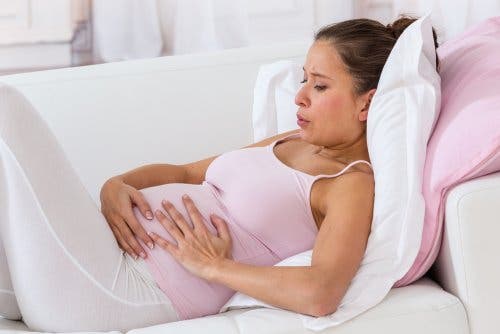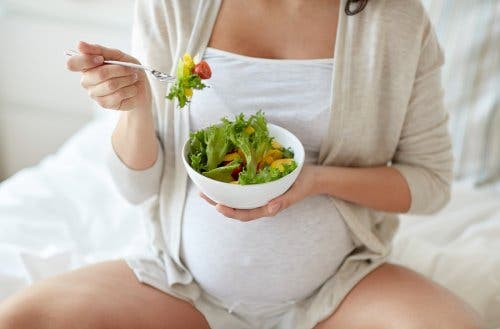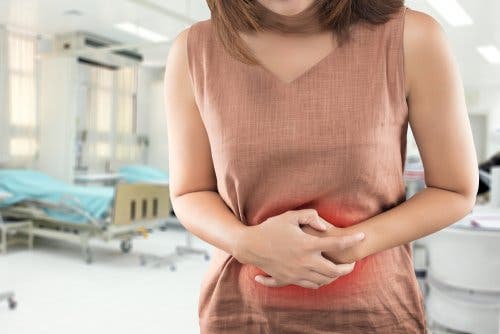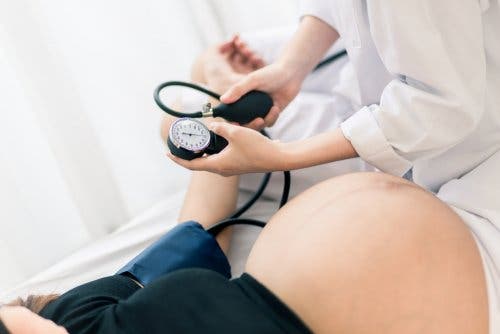What Causes Abdominal Pain in Pregnancy?

Abdominal pain in pregnancy is a cause for concern with mothers and, in fact, is the main reason for medical consultation. In this article, we’ll tell you why this discomfort occurs, how you can relieve it, and when it’s necessary to go to the hospital.
Abdominal pain in pregnancy
Abdominal pain in pregnancy is quite common due to the changes women’s bodies undergo during pregnancy. This usually doesn’t mean that you or your baby are in danger.
Generally, these situations occur due to the growth of the baby in the abdomen and, in many cases, resolve on their own. Below, we’ll answer what its possible causes are.
Main causes
1. Gas accumulation

The increase in progesterone levels usually produces muscle relaxation and slows down the digestive system, which is associated with the accumulation of gases.
On the other hand, in the third trimester, the baby is so big that it presses on the stomach, possibly affecting digestion. For this reason, in the final months, discomforts such as heartburn or indigestion are more common.
In addition, constipation can also generate flatulence and this, in turn, trigger colic. In fact, the accumulation of feces, which aren’t easily eliminated, can make it hard to eliminate gases. This can lead to discomfort.
You should also read: Eleven Habits You Should Avoid During Pregnancy
2. Round ligament pain
The round ligament is the one that connects your uterus to the groin. As your uterus stretches to make space for your baby, different discomforts can appear, ranging from sharp, stabbing, and intermittent pain to persistent, dull pain.
Round ligament pain usually occurs during the second trimester and tends to affect the pregnant woman’s hip or abdomen. Posture changes, coughing, or even laughing can trigger the discomfort.
3. Braxton Hicks contractions

In the second half of pregnancy, the famous Braxton Hicks contractions often appear, also called “practice contractions”. Although they’re bothersome, they aren’t dangerous. In fact, your body produces them to slowly prepare you for childbirth.
Braxton Hicks contractions often feel like a tightening of the gut. The stomach momentarily becomes firm and hard as a rock. However, they don’t cause pain but simply discomfort.
4. Other problems
Digestive problems, such as sensitivity to certain foods, urinary infections, kidney stones, or stomach viruses can cause temporary abdominal pain. Pay attention to these symptoms and properly treat them under medical supervision.
How to relieve abdominal pain in pregnancy

The causes of abdominal pain in pregnancy we described above aren’t serious nor threaten you or your baby’s health. If you want to ease your discomfort, you can:
- Avoid heavy meals. Eating a lot forces the stomach to work harder. Thus, it’s best to eat small meals several times a day to avoid discomfort.
- Eat calmly. When you eat fast, more air enters your stomach. This can cause flatulence.
- Avoid eating foods that produce gases. Cauliflower and broccoli tend to cause flatulence. Thus, it’s best to avoid consuming them, at least for a while!
- Avoid making sudden posture changes to minimize round ligament pain. Furthermore, these movements can also trigger Braxton Hicks contractions.
- Drink enough fluids to avoid constipation and dehydration. The latter can cause false contractions.
- Rest. Relaxing and getting some rest may be what you need to reduce abdominal discomfort.
When you should go to the hospital
Although abdominal pain in pregnancy usually isn’t serious and, instead, in most cases, is related to discomfort, you should see a doctor as soon as possible for different reasons. Here are the main reasons why you should go to the hospital.
1. Ectopic pregnancy

If you feel abdominal pain at the beginning of your pregnancy, whether it’s severe or mild, accompanied by vaginal bleeding, consult your doctor immediately. An ectopic pregnancy occurs when the egg is fertilized outside the uterus. This condition can be life-threatening if not treated early.
2. Miscarriage
Between weeks 13 and 20 of pregnancy, severe abdominal pain may indicate a miscarriage. In other words, for some reason, the fetus doesn’t continue to develop and is expelled by the body in the form of hemorrhage.
If you find yourself in this sad situation, it’s important that you visit your doctor for a checkup and take the necessary precautions to protect your health and enable a future pregnancy.
3. Placental abruption
The placenta provides the baby with oxygen and food through the umbilical cord. When placental abruption occurs, the placenta completely or partially separates itself from the wall of the uterus. This condition can make it hard for the baby to get the oxygen and nutrients it needs to continue developing.
Sudden and constant abdominal pain, accompanied by general malaise, may be indicative of placental abruption. In some cases, vaginal bleeding is observed, but, in others, the blood is trapped behind the placenta and, therefore, bleeding doesn’t occur.
The prevalence of placental abruption is 1 in 100 pregnancies. Therefore, at the slightest doubt, consult your doctor. This condition can cause premature labor or stillbirth in its most extreme forms.
4. Preeclampsia

This condition occurs due to reduced blood supply to the placenta. Its symptoms include fluid retention, protein in the urine, high blood pressure, and pain in the upper right part of the abdomen. If preeclampsia isn’t treated in time, it can compromise the life of the baby and the mother.
Read this article to learn more: All About Preeclampsia, a Complication of Pregnancy
5. Appendicitis
This condition usually causes pain in the lower right part of the abdomen, nausea, loss of appetite, and vomiting. In some cases, the pregnant woman also suffers from fever and diarrhea. Prompt medical attention is important to protect the health of both mother and baby.
6. Labor contractions
If you feel them, go to the hospital because it may be time for delivery! You can feel these contractions in your back. From there, they radiate to the lower abdomen. In addition, they become more intense and remain regular over time, their appearance accelerating over the hours and their duration increasing.
In short, abdominal pain in pregnancy is usually not a symptom of a serious illness. If you have any doubts or feel weak, fatigued, or have a fever, consult your doctor.
All cited sources were thoroughly reviewed by our team to ensure their quality, reliability, currency, and validity. The bibliography of this article was considered reliable and of academic or scientific accuracy.
- Sibai, B. M. (2015). Preeclampsia. In Protocols for High-Risk Pregnancies: An Evidence-Based Approach: Sixth Edition. https://doi.org/10.1002/9781119001256.ch39
- MedlinePlus. Desprendimiento de placenta. https://medlineplus.gov/spanish/ency/patientinstructions/000605.htm
- Aborto espontaneo. (2011). Progresos de Obstetricia y Ginecologia. https://doi.org/10.1016/j.pog.2010.10.008
- Korby, J. (2014). Desprendimiento prematuro de la placenta. Nursing (Ed. Española). https://doi.org/10.1016/s0212-5382(04)71737-9
- Cl, N. (2005). El Parto. American Journal of Obstetrics and Gynecology.
- Quirós, G., Piedra, R., Bolívar, M., & Solano, N. (2016). Parto Pretérmino. Revista Clínica de La Escuela de Medicina UCR-HSJD. https://doi.org/2215-2741
This text is provided for informational purposes only and does not replace consultation with a professional. If in doubt, consult your specialist.








